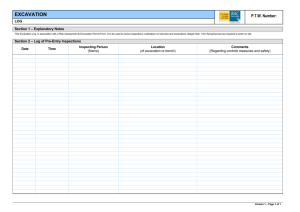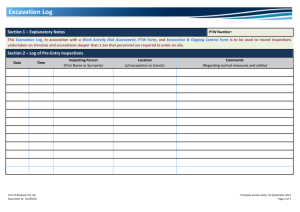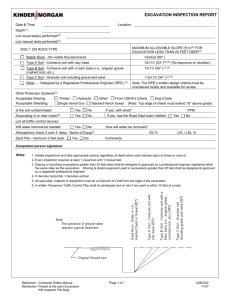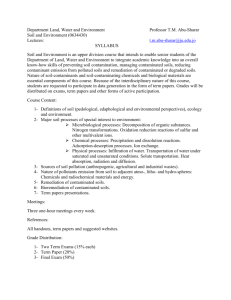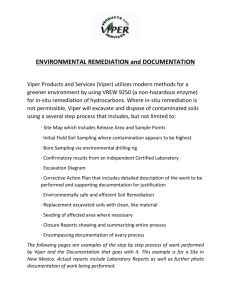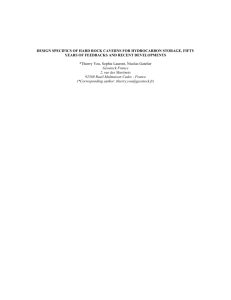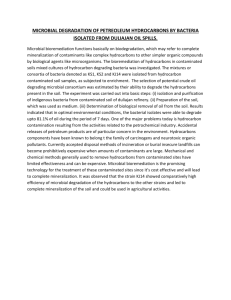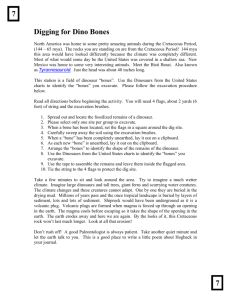02111 - Environmental Site Remediation or Hydrocarbons
advertisement
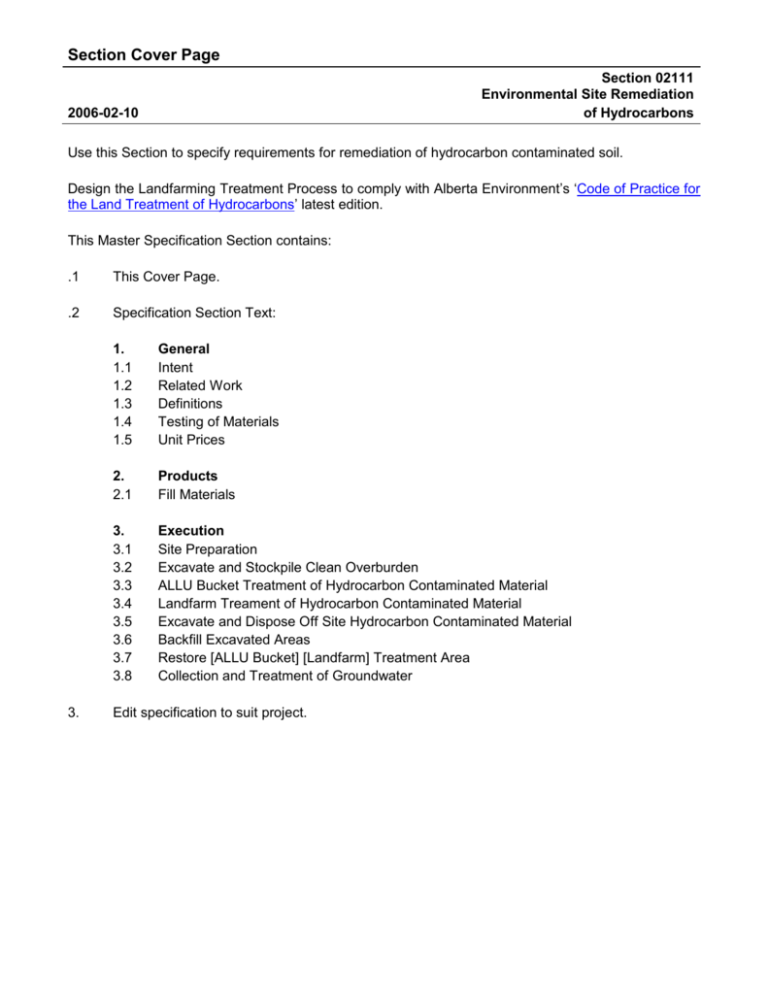
Section Cover Page Section 02111 Environmental Site Remediation of Hydrocarbons 2006-02-10 Use this Section to specify requirements for remediation of hydrocarbon contaminated soil. Design the Landfarming Treatment Process to comply with Alberta Environment’s ‘Code of Practice for the Land Treatment of Hydrocarbons’ latest edition. This Master Specification Section contains: .1 This Cover Page. .2 Specification Section Text: 3. 1. 1.1 1.2 1.3 1.4 1.5 General Intent Related Work Definitions Testing of Materials Unit Prices 2. 2.1 Products Fill Materials 3. 3.1 3.2 3.3 3.4 3.5 3.6 3.7 3.8 Execution Site Preparation Excavate and Stockpile Clean Overburden ALLU Bucket Treatment of Hydrocarbon Contaminated Material Landfarm Treament of Hydrocarbon Contaminated Material Excavate and Dispose Off Site Hydrocarbon Contaminated Material Backfill Excavated Areas Restore [ALLU Bucket] [Landfarm] Treatment Area Collection and Treatment of Groundwater Edit specification to suit project. Section 02111 Environmental Site Remediation of Hydrocarbons Page 1 Plan No: Project ID: 1. GENERAL 1.1 Intent .1 1.2 Related Work .1 .2 .3 .4 1.1 1.2 1.3 This section specifies requirements for excavating, remediation of hydrocarbon contaminated soil and backfilling. Earthwork Testing: Fill Materials: Earthwork General Requirements: Restoration of Sitework: Section 02010. Section 02056. Section 02305. Section 02951. Definitions .1 Landframing: is an ex-situ bioremediation technology in which the contaminated soil is excavated and positioned in specified layers in a treatment area that will control leaching of contaminants. The soil is periodically turned over or tilled to aerate the contaminant and optimize the rate of contaminant degradation. .2 ALLU Bucket: an attachment that is installed in place of the bucket on a loader or excavator. ALLU Bucket’s bucket has rotating drums that are controlled by the operator which break up and aerate the excavated contaminated material in a separate pile after ALLU Bucket treatment. Testing of Materials .1 At the discretion of the Minister, any fill materials may be tested before placement to confirm suitability for intended uses. .2 Submit fill material samples to the Minister for Standard Proctor Density Testing at least 7 days prior to placement. Unit Prices .1 Site Preparation .1 Unit description: Mobilization of equipment and personnel to site, install temporary fencing, access, signage, barricades, utility locates. .2 Unit of Measurement: Lump Sum. Contractor may not claim mobilization more than once. Plan No: Project ID: Section 02111 Environmental Site Remediation of Hydrocarbons Page 2 .2 Prepare and Restore [ALLU Bucket] [Landfarm] Treatment Area .1 Unit Description: Level treatment area, [place synthetic liner] [construct clay liner]. Supply clay for construction [from on site overburden stockpile] [contractors source off-site]. Restore area after treatment of contaminated material. .2 Unit of Measurement: Lump Sum. .3 Uncontaminated Topsoil Excavation .1 Unit Description: Strip, stockpile on-site and replace after excavation is backfilled. .2 Unit of Measurement: Cubic meter by [cut measure] [truck box measure] [stockpile]. .4 Excavate, Stockpile and Replace Uncontaminated Overburden .1 Unit Description: Excavate, stockpile on site, replace with compacted uncontaminated overburden in area to be excavated for treatment. .2 Unit of Measurement: Cubic Meter by [cut measure] [truck box measure] [stockpile measure]. .5 Excavate, Hydrocarbon Impacted Soil using ALLU Bucket Process .1 Unit Description: Excavate, load and haul hydrocarbon impacted material to treatment area. Treat material to criteria using the ALLU Bucket process until it meets specified criteria. Replace and compact treated material in excavation. [Include the cost of handling and disposal of contaminated and uncontaminated groundwater.] .2 Unit of Measurement: Cubic meter by [cut measure] [truck box measurements] [lump sum] [number of passes]. SPEC NOTE: If lump sum, cubic meter or truck box measure are selected ensure adequate analytical information is available in the documents that will allow bidders to determine amount of treatment effort required. SPEC NOTE: If contaminated groundwater handling and disposal is NOT included in 1.3.5 ensure a cash allowance is included in the specification. .6 Excavate Hydrocarbon Impacted Soil and Landfarm .1 Unit Description: Excavate, load and haul hydrocarbon impacted material to treatment area. Spread material in thickness not to exceed [300 mm] [ ]. Landfarm material until specified criteria has been met. Replace and compact treated material in excavation. [Include the cost of handling and disposal of contaminated and uncontaminated groundwater.] .2 Unit of Measurement: .1 Cubic meter by [cut measure] [truck box measure] [lump sum]. .2 Landfarm: [Lump Sum] [per landfarm event]. SPEC NOTE: If lump sum, cubic meter or truck box measure are selected ensure adequate analytical information is available in the documents that will allow bidders to determine amount of treatment effort required. Section 02111 Environmental Site Remediation of Hydrocarbons Page 3 Plan No: Project ID: SPEC NOTE: If contaminated groundwater handling and disposal is NOT included in 1.3.6 ensure a cash allowance is included in the specification. .7 Excavate Hydrocarbon Impacted Soil and Dispose From Site .1 Unit Description: Excavate, load and haul off site hydrocarbon impacted material to an approved disposal area or landfill. .2 Unit of Measure: Cubic meter by [cut measure] [truck box measure] [lump sum]. .8 Imported Clay Fill .1 Unit Description: Supply, haul, place and compact imported impacted clay fill. .2 Unit of Measurement: Cubic meter by [cut measure] [truck box measure]. .9 Imported Topsoil .1 Unit Description: Supply, haul and place, imported topsoil. .2 Unit of Measurement: Cubic meter [measured in excavation] [truck box measure] .10 Imported Gravel .1 Supply, haul, place and compact [ ]mm gravel .2 Unit of Measurement: [measured in excavation] [truck box measure] [tonne] 2. PRODUCTS 2.1 Fill Materials .1 Refer to Section 02056 for fill material product specifications. 3. EXECUTION 3.1 Site Preparation .1 Notify Alberta One Call and locate all member-company utilities including sewer, power, gas, telephone and others. Utilize a private utility locator to verify the Alberta One Call locates and identify the locations of any private utilities or services. Locate all utilities before proceeding with the excavation. .2 Coordinate with utility company to remove and/or relocate utility lines as required to safely undertake the Work of this Contract. SPEC NOTE: If utility lines are to be relocated include appropriate specification sections and method of payment. .3 Expose existing utility lines in the work area by hand excavation or hydrovac to confirm location before machine digging within 600 mm of lines. Section 02111 Environmental Site Remediation of Hydrocarbons Page 4 Plan No: Project ID: 3.2 .4 Remove surface obstructions in the work area. .5 Prior to commencement of site excavation activities, install temporary chain-link fence, [1.8] [ ]m high, to secure the excavation area. The chain link fence should provide access for vehicles and equipment but must be locked when no work is occurring onsite. .6 Attach signs to temporary fencing on four sides of the excavation prior to the commencement of the soil excavation. Signs must indicate that site access is restricted to; .1 authorized personnel only, .2 identify safety requirement (i.e. hard hat, safety boots, etc.), .3 provide a telephone number for inquiries and emergency contact. .7 Confirm stockpile area for clean overburden and topsoil with Minister’s representative. Excavate and Stockpile Clean Overburden .1 Saw, cut and remove asphalt or concrete required for excavation and dispose at approved location or landfill. .2 Direct runoff away from, or around, excavation. .3 Strip topsoil, uncontaminated overburden and granular materials and stockpile separately on site in area indicated on drawings. Do not mix materials. .4 Remediate soil to comply with the criteria established in the Risk Management Guidelines for Petroleum Storage Tank Sites dated October 2001. Remediation criteria for this site is based on: .1 Soil Type: [Fine] [Course] grained .2 Land Usage: [Commercial/Industrial] [Residential] SPEC NOTE: Consult with the Project Manager to determine the intended future land usage. SPEC NOTE: To complete the following table use parameters in Tables 1 and 2 of the document entitled “Risk Management Guidelines for Petroleum Storage Tank Sites”. Use the values appropriate for the soil type and the intended land use. Section 02111 Environmental Site Remediation of Hydrocarbons Page 5 Plan No: Project ID: .5 Remediate soil to meet or exceed the following minimum remediation criteria: Remediation Criteria for Generic Hydrocarbon and Lead Parameter Benzene Toluene Ethylbenzene Xylenes F1 (C6-C10) F2 (C10 – C16) F3 (C16 – C34) F4 (C34 – C50) Lead 3.3 Concentration (mg/kg) [ ] [ ] [ ] [ ] [ ] [ ] [ ] [ ] [ ] ALLU Bucket Treatment of Hydrocarbon Contaminated Material .1 Prepare ALLU Bucket Treatment Area .1 Construct ALLU Bucket treatment area in location shown on drawings. .2 Construct ALLU Bucket treatment area to accommodate [all] [ m3] material to be treated. OR .2 Construct ALLU Bucket treatment area as shown in details on drawings. .2 Excavate Hydrocarbon Impacted Soil and Treat to Criteria .1 Excavate to elevation and dimensions as indicated by Minister. .2 Transport hydrocarbon impacted soil to ALLU Bucket treatment area. Stockpile within bermed area. .3 Assist Minister in the collection of representative soil and ground water samples from the walls and base of excavation. .4 Pass hydrocarbon impacted soil through ALLU Bucket treatment and stockpile within bermed area to contain runoff, pending direction from the Minister. The Minister will sample and analyze treated soils to confirm hydrocarbon concentrations using an independent laboratory on a regular turnaround basis to determine if additional ALLU Bucket treatment passes are required. No payments will be made for standby time while waiting for the results of the confirmation samples. Ensure that treated material meets applicable criteria. .5 Assist Minister in collection of representative soil and water samples for the base and walls of the excavation. .6 Direct surface run off away from hydrocarbon impacted soil stockpiles. Section 02111 Environmental Site Remediation of Hydrocarbons Page 6 Plan No: Project ID: 3.4 3.5 3.6 Landfarm Treatment of Hydrocarbon Contaminated Material .1 Prepare Landfarm Treatment Area .1 Construct Landfarm Treatment Area in location shown on drawings. .2 Construct Landfarm Treatment Area to accommodate [all] [ m3] of soil to be treated. OR .2 Construct Landfarm Treatment Area as shown in details on drawings. .2 Excavate Hydrocarbon Impacted Soil and Treat to Criteria .1 Excavate to elevations and dimensions as indicated by Minister. .2 Transport hydrocarbon impacted material to Landfarm Treatment Area. .3 Spread material within bermed area to a thickness not exceeding [300 mm] [ mm] .4 Disc material, turn and mix materials regularly at intervals not to exceed [5 days] [ days] until material meets the required criteria. .5 The Minister will sample and analyze treated soils to confirm hydrocarbon concentrations using independent laboratories on a regular turnaround basis. There will be no standby time while waiting for the results of the confirmation samples. .6 Assist Minister in collection of representative soil and groundwater samples from the walls and base of the excavation. .7 Treated material that has met required criteria may be stockpiled or replaced in clean excavation. Excavate and Dispose Off Site Hydrocarbon Contaminated Material .1 Excavate to elevations and dimensions indicated by Minister. .2 Transport Hydrocarbon impacted material to a disposal area or landfill approved by the Minister. .3 Supply a copy of the manifest or proof of receipt of material, acceptable to the Minister, from the disposal facility. Backfill Excavated Areas .1 Backfill all excavation areas, and fill to required sub-grade elevations using the treated soils, clean overburden, and additional imported [clay] [ mm gravel] as specified in Section 02056 Fill Materials. .2 Ensure backfill areas are free of debris, snow, ice and water. Do not backfill over porous, wet or spongy sub-grade surfaces. Section 02111 Environmental Site Remediation of Hydrocarbons Page 7 Plan No: Project ID: 3.7 .3 Place backfill material in excavation in maximum 150 mm [ m] lifts to facilitate optimum compaction and compact using mechanical methods. Do not use hydraulic methods, vehicles or other equipment not design for compacting. .4 Maintain optimum moisture content of materials being compacted, as required attain a specified compaction density of 98% [ %] of the Standard Proctor Density +2% of optimum. .5 Use care in backfilling to avoid damage or displacement of services. .6 Surface to be graded to ensure drainage away from backfilled areas. Restore [ALLU Bucket] [Landfarm] Treatment Area .1 Remove berms, membrane and restore treatment area to original condition. .2 Suitable material from berms may be used as backfill in the excavation after the material has been assessed for suitability by the Minister and testing has confirmed that hydrocarbon concentrations are within criteria specified in 3.2.5. OR .2 3.8 Remove all material from site to disposal location acceptable to the Minister. Collection and Treatment of Groundwater .1 During the excavation of the impacted soils, hydrocarbon contaminated groundwater and/or free product may be encountered. Contaminated soils may also be located below the depth of the groundwater. In the event that contaminated groundwater is encountered, the contractor will be responsible for the dewatering of the excavation and placement of the water in storage tanks. .2 The contractor may be asked to supply a regenerative blower, necessary piping and hoses to aerate collected contaminated water until it meets Canadian Environments Guidelines for Freshwater Aquatic Life Criteria. Alternatively the contractor may be asked to haul the collected contaminated water to an acceptable disposal location. .3 Uncontaminated groundwater may be disposed off-site at the discretion of the contractor. .4 The collection, treatment or disposal of groundwater will be [paid under the Cash Allowance] [payment is included in the unit cost for the treatment of hydrocarbon contaminated soils]. .5 Assist the Minister to obtain samples of collected groundwater samples. The Minister will submit samples to an independent laboratory to determine hydrocarbon contamination. Lab Section 02111 Environmental Site Remediation of Hydrocarbons Page 8 Plan No: Project ID: analyses will be completed on a regular turnaround basis and there will be no standby time paid while waiting for the results. SPEC NOTE: If further restoration is required use Section 02951 (Restoration of Sitework) and other section as appropriate. END OF SECTION
